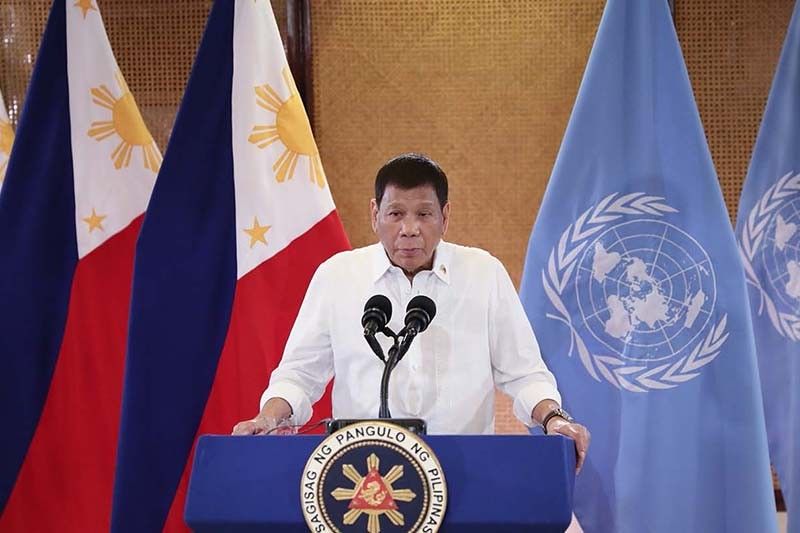Duterte asks rich nations to deliver on climate finance pledges

MANILA, Philippines — President Rodrigo Duterte called on wealthy nations to fulfill their financial assistance to developing countries like the Philippines to help them bolster their defenses against the catastrophic impacts of the climate crisis.
In a speech during the United Nations General Assembly on Wednesday, Duterte called for urgent climate action, “especially from those that can truly tip the balance.”
“The greatest injustice here is that those who suffer the most are those the least responsible for this existential crisis,” the chief executive said.
“Developed countries must fulfill their longstanding commitment to climate financing, technology transfer, and capacity-building in the developing world. This is a moral obligation that cannot be avoided,” he added.
Duterte made the call less than six weeks before the COP26 climate conference due to take place from October 31 to November 12 in Glasgow, Scotland. The summit is seen as critical to keeping alive the goal of limiting global warming to 1.5 degrees Celsius above pre-industrial levels.
Last week, the Organisation for Economic Cooperation and Development reported that rich countries overall contributed $79.6 billion of international climate finance in 2019, well below the UN climate finance goal of $100 billion per year by 2020.
Share of responsibility
Duterte also told world leaders that the Philippines “accepts its share of responsibility and will do its part to avert this collective disaster.”
The country committed to reduce its greenhouse gas emissions by 75% in 2030. But only 2.71% of the target is unconditional, which means it will be undertaken without international funding and assistance.
“While it is good that the current administration has called for a coal moratorium, several coal projects remain in the pipeline, and the unconditional commitments in the Nationally Determined Contributions to reduce emissions remain insignificant,” Greenpeace Philippines country director Lea Guerrero said.
Guerrero also urged the government to abandon their nuclear ambitions as pursuing nuclear energy “contradicts all of his calls for climate justice, equality, inclusive green economy and the protection of people.”
“Instead of pursuing nuclear and fossil gas, the government must focus its efforts in ensuring that the right policies are in place to enable this massive uptake of renewable energy,” she said.
The government must call for accountability from fossil fuel companies, Guerrero added. — with report from Agence France-Presse
At current levels of greenhouse gas emissions, Earth could warm by 1.5 degrees Celsius (2.7 degrees Fahrenheit) as early as 2030, the Intergovernmental Panel for Climate Change says in a landmark report.
"Global warming is likely to reach 1.5C between 2030 and 2052 if it continues to increase at the current rate," the report concluded with "high confidence."
Earth's surface has warmed one degree Celsius (1.8 degrees Fahrenheit)—enough to lift oceans and unleash a crescendo of deadly storms, floods and droughts—and is on track toward an unliveable 3C or 4C rise.
Japan issued heatstroke alerts Sunday to tens of millions of people as near-record high temperatures scorched swathes of the country, while torrential rain pummelled other regions.
National broadcaster NHK warned viewers that the heat was at life-threatening levels, as temperatures soared to nearly 40 degrees Celsius (104 degrees Fahrenheit) in some places, including the capital Tokyo.
"Please stay hydrated and use air conditioners appropriately, and refrain from outings that seem difficult," a news presenter said. — AFP
Developing countries voice "disappointment" as climate talks in Germany ended Thursday with frustrations flaring over a lack of momentum on helping vulnerable nations cope with the impacts of warming.
With world attention drawn towards other challenges, notably Russia's invasion of Ukraine and spiralling food, energy and economic crises, the technical discussions meant to lay the groundwork for key United Nations negotiations later this year were mired in disagreements.
Representatives of nearly 200 countries arrived in the city of Bonn buoyed by the ambition displayed six months ago during the UN COP26 negotiations in Glasgow, where countries rallied around the urgent threat of climate change.
"After that sense of emergency had been established, probably the expectations were very high," says Preety Bhandari, senior climate adviser at the World Resources Institute. — AFP
Negotiators from almost 200 countries will meet in Bonn Monday for climate talks tasked with reigniting momentum on tackling global warming, as Russia's invasion of Ukraine overshadows the threat from rising emissions.
The conference will set the stage for a fresh round of major United Nations talks later this year in Egypt.
It will also be a chance to test the resolve of nations facing a catalogue of crises, including escalating climate impacts, geopolitical tensions, bloodshed in Ukraine and the threat of a devastating global food crisis.
"Climate change is not an agenda we can afford to push back on our global schedule," said outgoing UN climate change chief Patricia Espinosa ahead of the meeting. — AFP
Nations in the G20 group of major economies have yet to strengthen greenhouse gas reduction goals despite agreeing to revisit their plans ahead of critical UN climate talks in November, according to an analysis by leading research NGOs seen exclusively by AFP.
At the Glasgow COP26 climate summit last year countries pledged to review inadequate plans for cutting carbon pollution this decade ahead of the COP27 conference.
Two G20 nations — India and Turkey — have failed to update their original carbon cutting plans submitted in 2015, as required under the Paris Agreement.
Neither has non-G20 member Egypt, which will host the COP27 climate summit in November. — AFP
Four key climate change indicators all set new record highs in 2021, the United Nations said Wednesday, warning that the global energy system was driving humanity towards catastrophe.
Greenhouse gas concentrations, sea level rise, ocean heat and ocean acidification all set new records last year, the UN's World Meteorological Organization (WMO) said in its "State of the Global Climate in 2021" report.
"The global energy system is broken and bringing us ever closer to climate catastrophe," UN Secretary-General Antonio Guterres said of the findings. — AFP
- Latest
- Trending































